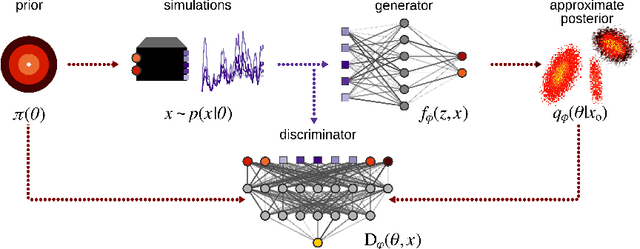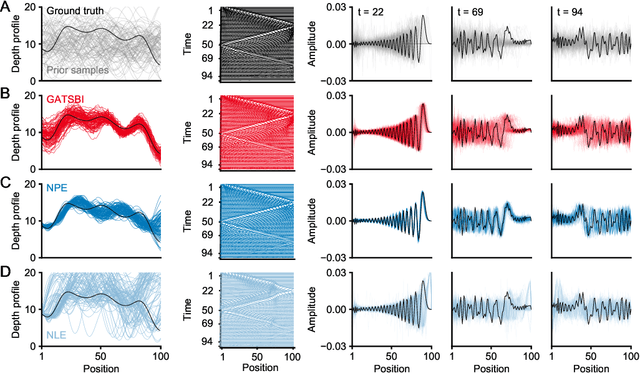Álvaro Tejero-Cantero
sbi reloaded: a toolkit for simulation-based inference workflows
Nov 26, 2024
Abstract:Scientists and engineers use simulators to model empirically observed phenomena. However, tuning the parameters of a simulator to ensure its outputs match observed data presents a significant challenge. Simulation-based inference (SBI) addresses this by enabling Bayesian inference for simulators, identifying parameters that match observed data and align with prior knowledge. Unlike traditional Bayesian inference, SBI only needs access to simulations from the model and does not require evaluations of the likelihood-function. In addition, SBI algorithms do not require gradients through the simulator, allow for massive parallelization of simulations, and can perform inference for different observations without further simulations or training, thereby amortizing inference. Over the past years, we have developed, maintained, and extended $\texttt{sbi}$, a PyTorch-based package that implements Bayesian SBI algorithms based on neural networks. The $\texttt{sbi}$ toolkit implements a wide range of inference methods, neural network architectures, sampling methods, and diagnostic tools. In addition, it provides well-tested default settings but also offers flexibility to fully customize every step of the simulation-based inference workflow. Taken together, the $\texttt{sbi}$ toolkit enables scientists and engineers to apply state-of-the-art SBI methods to black-box simulators, opening up new possibilities for aligning simulations with empirically observed data.
Fast and Reliable Probabilistic Reflectometry Inversion with Prior-Amortized Neural Posterior Estimation
Jul 26, 2024Abstract:Reconstructing the structure of thin films and multilayers from measurements of scattered X-rays or neutrons is key to progress in physics, chemistry, and biology. However, finding all structures compatible with reflectometry data is computationally prohibitive for standard algorithms, which typically results in unreliable analysis with only a single potential solution identified. We address this lack of reliability with a probabilistic deep learning method that identifies all realistic structures in seconds, setting new standards in reflectometry. Our method, Prior-Amortized Neural Posterior Estimation (PANPE), combines simulation-based inference with novel adaptive priors that inform the inference network about known structural properties and controllable experimental conditions. PANPE networks support key scenarios such as high-throughput sample characterization, real-time monitoring of evolving structures, or the co-refinement of several experimental data sets, and can be adapted to provide fast, reliable, and flexible inference across many other inverse problems.
Predictive, scalable and interpretable knowledge tracing on structured domains
Mar 19, 2024Abstract:Intelligent tutoring systems optimize the selection and timing of learning materials to enhance understanding and long-term retention. This requires estimates of both the learner's progress (''knowledge tracing''; KT), and the prerequisite structure of the learning domain (''knowledge mapping''). While recent deep learning models achieve high KT accuracy, they do so at the expense of the interpretability of psychologically-inspired models. In this work, we present a solution to this trade-off. PSI-KT is a hierarchical generative approach that explicitly models how both individual cognitive traits and the prerequisite structure of knowledge influence learning dynamics, thus achieving interpretability by design. Moreover, by using scalable Bayesian inference, PSI-KT targets the real-world need for efficient personalization even with a growing body of learners and learning histories. Evaluated on three datasets from online learning platforms, PSI-KT achieves superior multi-step predictive accuracy and scalable inference in continual-learning settings, all while providing interpretable representations of learner-specific traits and the prerequisite structure of knowledge that causally supports learning. In sum, predictive, scalable and interpretable knowledge tracing with solid knowledge mapping lays a key foundation for effective personalized learning to make education accessible to a broad, global audience.
Spatiotemporal modeling of European paleoclimate using doubly sparse Gaussian processes
Nov 15, 2022Abstract:Paleoclimatology -- the study of past climate -- is relevant beyond climate science itself, such as in archaeology and anthropology for understanding past human dispersal. Information about the Earth's paleoclimate comes from simulations of physical and biogeochemical processes and from proxy records found in naturally occurring archives. Climate-field reconstructions (CFRs) combine these data into a statistical spatial or spatiotemporal model. To date, there exists no consensus spatiotemporal paleoclimate model that is continuous in space and time, produces predictions with uncertainty, and can include data from various sources. A Gaussian process (GP) model would have these desired properties; however, GPs scale unfavorably with data of the magnitude typical for building CFRs. We propose to build on recent advances in sparse spatiotemporal GPs that reduce the computational burden by combining variational methods based on inducing variables with the state-space formulation of GPs. We successfully employ such a doubly sparse GP to construct a probabilistic model of European paleoclimate from the Last Glacial Maximum (LGM) to the mid-Holocene (MH) that synthesizes paleoclimate simulations and fossilized pollen proxy data.
GATSBI: Generative Adversarial Training for Simulation-Based Inference
Mar 12, 2022



Abstract:Simulation-based inference (SBI) refers to statistical inference on stochastic models for which we can generate samples, but not compute likelihoods. Like SBI algorithms, generative adversarial networks (GANs) do not require explicit likelihoods. We study the relationship between SBI and GANs, and introduce GATSBI, an adversarial approach to SBI. GATSBI reformulates the variational objective in an adversarial setting to learn implicit posterior distributions. Inference with GATSBI is amortised across observations, works in high-dimensional posterior spaces and supports implicit priors. We evaluate GATSBI on two SBI benchmark problems and on two high-dimensional simulators. On a model for wave propagation on the surface of a shallow water body, we show that GATSBI can return well-calibrated posterior estimates even in high dimensions. On a model of camera optics, it infers a high-dimensional posterior given an implicit prior, and performs better than a state-of-the-art SBI approach. We also show how GATSBI can be extended to perform sequential posterior estimation to focus on individual observations. Overall, GATSBI opens up opportunities for leveraging advances in GANs to perform Bayesian inference on high-dimensional simulation-based models.
 Add to Chrome
Add to Chrome Add to Firefox
Add to Firefox Add to Edge
Add to Edge